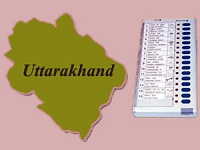The Hindu Editorial – March 21 : In Uttarakhand, a mandate for renewal

The Hindu Editorial – March 21 :
In Uttarakhand, a mandate for renewal
(Meaning of the words given in Bold)
Uttarakhand’s unique challenges demand a concerted (Co-operative) effort by the new BJP government
Heading into Assembly elections in Uttarakhand, the Bharatiya Janata Party had a clear edge after months of political turmoil (A violent disturbance) in the State, that included a spell of President’s Rule and the Supreme Court’s intervention (Interfering). Chief Minister Harish Rawat had sought (looked for, Attempted) to turn the elections into a referendum (A popular vote by the electorate whether to approve a specific legislative act) over the tribulations (An annoying, frustrating or catastrophic event, trials) that his government was subjected to by both the BJP and its government at the Centre. At the same time, his government had struggled to defend itself against allegations (accusation, a claim or assertion that someone has done something illegal or wrong, typically one made without proof.) of graft (Bribery). In the event, the BJP managed to repeat its performance of the Lok Sabha election in 2014, when it won in all five parliamentary constituencies and led in 63 out of 70 Assembly segments. By winning 57 seats in the Assembly elections, the BJP has for the first time managed a decisive (Unmistakable) majority in a State that has traditionally returned close verdicts (Judgments). By all indications, it reaped (gather) the benefit of anti-incumbency due to issues such as migration (Movement) from the hills to the plains and out of Uttarakhand as well, lack of adequate (Enough) employment opportunities and infrastructure, and persisting problems relating to the 2013 floods. In 2014, the BJP’s pitch on “development” received significant support and it has now promised to focus on the issue. Conversely, the Congress’s lament (Express grief verbally) that it did not receive adequate Central support in both flood relief and reconstruction apart from developmental work in the State clearly found few takers among the voters, who simply chose the party in power at the Centre.
The Congress also made the mistake of limiting the election campaign to a personality contest centred on Mr. Rawat. Stung (Aroused to impatience or anger, Annoyed) by the defection of many leaders to the BJP, especially from the Garhwal region, and faced with the formidable (Extremely impressive in strength or excellence) challenge of overcoming the popularity of Prime Minister Narendra Modi, the party came up short. The success of the BJP must also take into account the fact that 11 of its 57 MLAs are defectors ((military) a person who abandons their duty) from the Congress. By appointing Trivendra Singh Rawat as the Chief Minister instead of its hopeful former Chief Ministers, the BJP has sought to empower a loyal RSS hand who is close to party president Amit Shah and Mr. Modi. Despite the overwhelming (So strong as to be irresistible, Overcoming) majority for the party which should allow the new Chief Minister to concentrate on administrative tasks instead of constantly managing MLAs to defend narrow majorities in the House, he faces an uphill battle. Since the separation from Uttar Pradesh, Uttarakhand saw high economic growth till around 2012-13, justifying the bifurcation (Branch). But the floods had a devastating (Sharply critical or damaging) impact on its economy, and the long-time decline of the agrarian (Farming) economy in the hills and the consequent migration of people to the plains have deepened the challenges facing the State. It will take a concerted effort to overcome them.





